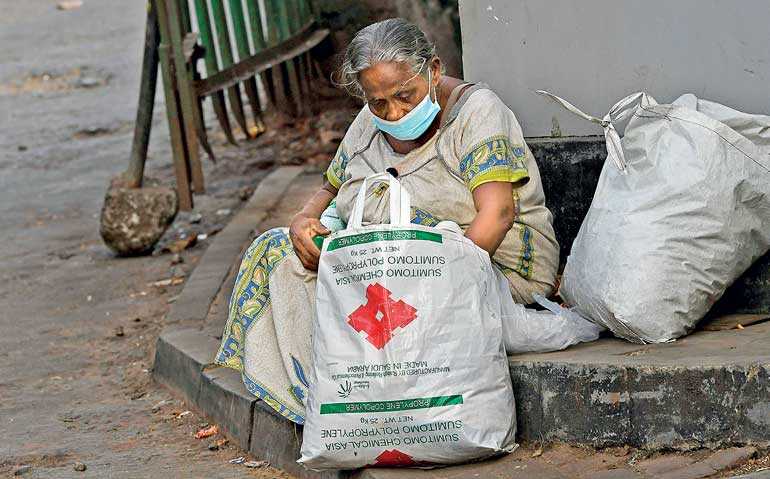Wednesday Feb 18, 2026
Wednesday Feb 18, 2026
Tuesday, 3 November 2020 00:20 - - {{hitsCtrl.values.hits}}

The post-COVID-19 world has greatly amplified unsustainable and irresponsible revenue generation by corporates being mainly responsible for the numerous issues and challenges faced by society, increasing economic inequality, greater widening of the gap between the rich and poor, and environmental degradation – Pic by Shehan Gunasekara
Redefining global markets
We are living in a time, globally markets are redefined, re-assessed, and the viability of business sustainability and business continuity based on the old models that existed prior to COVID-19.
Almost for two decades global business entities carried on regardless with their agenda. Corporate business dashboards, KPIs were significantly tilted towards the aggressive profit maximisation with a single focus on the top line and the bottom line.
Wider stakeholder ROI
In a dynamically strong and an evolving and democratic society there has to be room for the inflow of private capital to nurture innovation, creativity and solutions to resolve the social issues, challenges and demands of the society.
However this needs to be reflected on business models and frameworks where all the stakeholders should receive the benefit of usage of the capital investment. In essence, the benefits of the return on investment (ROI) should be more inclusive to cover all the stakeholders for their contribution, engagement, and the resource utilisation.
Failure of the triple bottom-line approach
The concept of triple bottom line, the Planet, People, Profit and the Corporate Social Responsibility CSR and all the initiatives and programs used by the global and local corporates and business leaders merely showcase as a feather in their business cap and not as a part of their business DNA. That’s the reason the world has seen enough and more demonstration of corporate greed at the exploitation of the other key stakeholders.
The post-COVID-19 world has greatly amplified unsustainable and irresponsible revenue generation by the corporates being mainly responsible for the numerous issues and challenges faced by society, increasing economic inequality, greater widening of the gap between the rich and poor, and environmental degradation, etc.
Profit to the progress of the planet and the people
All business entities, from global corporate giants and local business conglomerates to SMEs, are needed to recognise they are part of the bigger surface that their businesses are standing on, and if the surface becoming weak there is no possibility they can stand strongly on their own.
Therefore any business entity needs to be aware of there are number of key equal stakeholders that are energising and impacting the business entity – the shareholders that will let their private capital flow, the employees that will be the driving force of the business, the customers who pay value to the purchase of the solutions presented by the businesses, and the society and the fabric of the environment that any businesses stands on.
It is very clear that COVID-19 has now thrown all to the deep end, we need to go beyond approach of triple bottom line, planet, people, profit to a quadruple bottom line to articulate and mandate the business corporate to work on the fourth P which is the Progress of the planet and the people.
Business corporates need to have the conviction that unless the profit they make out of the planet and the people is now ploughed back to the Progress of the planet and the people, there is no business sustainability and continuity.
Purpose of profit and profit with a purpose
Profit with a purpose has much wider and greater inclusivity showcase that the profit generated is now benefitting and impacting all stakeholders. The leadership of the business entities at the very outset lays the framework for KPI that will translate to show case the profit with a purpose.
Return on Investment (ROI) for each of the stakeholders, the shareholders, employees, customers, society and the planet should be rightfully enshrined and ensure no stakeholder is exploited and sacrificed for the benefit of the other.
Transcending to create a socially impactful entrepreneur ecosystem
Prior to COVID 19, most of business conglomerates globally and locally and numerous other business entities greatly focused and worked on the top line and the bottom line. But when COVID-19 hit, except for some of the leading tech and tech-retail giants, in all industry sectors, from airline, to travel, hospitality, banking and finance and many other business and industry sectors were affected. They are no longer advocating the top line and the bottom line but the lifeline to survive, sustain and surge ahead.
In a living ecosystem there is the existence of species of different shapes and sizes, from nano, micro, small and medium, big and large, which are interdependent, integrated and interwoven, and when one is affected, all get impacted. The COVID-19 lockdown first affected the informal sector of nano and micro entrepreneurs and thereafter the rest, SMEs and large corporates.
It is now very evident without the lifeline running throughout the fabric of the ecosystem touching entrepreneurs from nano to micro to SME to large and corporate, strategising on a top line and the bottom line is not sustainable. Further, absolute conviction of the business entities and corporates that if the profit generated by using the planet and the people is not ploughed back to the progress of planet and the people, there is no sustainability.
Profit with a Purpose (PwP) for responsible business sustainability and continuity will transcend businesses and entrepreneurs to more responsible to enhance, empower and enrich the society economically, of which they are an integral part.
(The writer is the Chairman of Lanka Impact Investing Network, People’s Merchant Finance Plc and C-founder Ath Pauvra.)